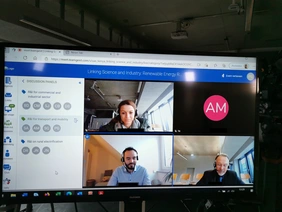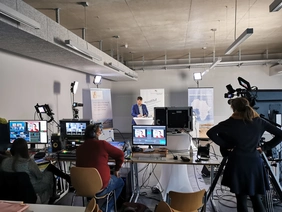With 75 attendees in total the digital conference “Linking Science and Industry: Renewable Energy Research, Innovation and Higher Education in Africa“ took place last Wednesday and Thursday (15.+16.12.2021). The conference was organized by the Institute of new Energy Systems (InES) of the Technische Hochschule Ingolstadt (THI) as part of the East African Network of Excellence for Universities of applied sciences.
Due to the rising demand for qualified specialists with practice-oriented degrees in Kenya and other African countries, especially in the field of renewable energies, a more practical focused higher education is necessary. Therefore, universities need to cooperate more closely with the industry. But also further research and innovation cooperation between Africa and Europe as well as the transfer of knowledge can contribute to the development towards a more practice-oriented higher education in Kenya and other African countries.
Through the conference, 3 goals should be achieved. First, the participants from all over Africa and Europe should get an insight in the topic Renewable Energies in Africa including the status quo, challenges but also opportunities. Second, research and innovation cooperation flagship projects between Africa and EU were presented to the conference participants in order to sensitise them, how international cooperation can contribute to a more practical teaching and research approach. The third main goal was to jointly develop an understanding for the challenges and opportunities for higher education capacity building.
In order to achieve the set conference goals, in addition to the speakers presentations and panel discussions, the participants had the opportunity to be part of digital discussion rounds, where they could share their point of view and be part of a joint knowledge generation. In addition, attendees had the chance to participate in guided, digital laboratory tours, 360° poster exhibition or to connect themselves with other participants via the online platform especially set up for the conference.
To sum up, in two days of digital conference, 15 lectures with speakers from Africa and Europe, 2 round tables, 3 moderated discussion panels, a possibility for digital networking, 2 guided virtual laboratory tours as well as a 360° lobby with info material of 7 Kenyan partner universities and InES were offered.
The conference was organized in the scope of the UAS Kenya project, funded by German Academic Exchange service (DAAD), and functioned as a public closing event.



![[Translate to English:] Logo Akkreditierungsrat: Systemakkreditiert](/fileadmin/_processed_/2/8/csm_AR-Siegel_Systemakkreditierung_bc4ea3377d.webp)








![[Translate to English:] Logo IHK Ausbildungsbetrieb 2023](/fileadmin/_processed_/6/0/csm_IHK_Ausbildungsbetrieb_digital_2023_6850f47537.webp)


